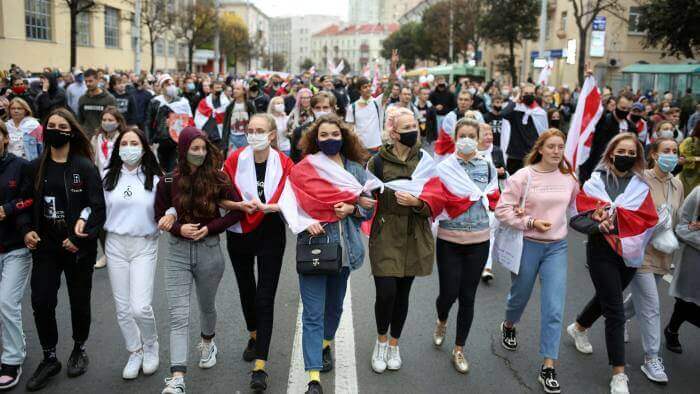The United Kingdom (UK) and Canada have imposed sanctions on Belarus President Alexander Lukashenko, his son, and members of his government following the Eastern European country’s disputed elections and the massive crackdown on human rights and protests. The two Western powers have joined the Baltic states in introducing sanctions against Lukashenko’s authoritarian regime.
On Tuesday, British Foreign Secretary Dominic Raab said that the sanctions had been introduced in a coordinated manner with Ottawa “in a bid to uphold democratic values and put pressure on those responsible for repression.” The UK’s sanctions comprise of travel bans and asset freezes on Lukashenko, his son and national security advisor Viktor Lukashenko, along with six other high-ranking Belarusian officials. “We will hold those responsible for the thuggery deployed against the Belarusian people to account,” Raab added.
In addition to those on the UK’s list, Canada has sanctioned three other leaders. In an official statement, Ottawa said that the Belarusian administration had conducted “a systematic campaign of repression and state-sponsored violence against public protests and the activities of opposition groups” in the aftermath of the country’s “fraudulent” presidential elections in August.
“Canada will not stand by silently as the Government of Belarus continues to commit systematic human rights violations and shows no indication of being genuinely committed to finding a negotiated solution with opposition groups,” said Foreign Minister François-Philippe Champagne, adding that Ottawa stands in solidarity with the Belarusian people’s efforts at achieving democracy, and that “Canada and the United Kingdom are acting together to ensure these sanctions have a greater impact and to demonstrate unity in our condemnation of the situation.”
Earlier this month, Lukashenko’s primary opposition challenger, Svyatlana Tsikhanouski, urged the United Nations (UN) Security Council to impose sanctions on “the individuals that committed electoral violations and crimes against humanity” and take punitive measures against the opposition’s violent crackdowns on protestors. During her election campaign, Tsikhanouski was forced to move her children to an undisclosed location in Europe for their safety after receiving several death and sexual assault threats from Lukashenko’s supporters.
The sanctions announced yesterday are part of Canada and Britain’s larger diplomatic efforts to help the people of Minsk create positive change. In addition to the recent measures, both Canada and the UK have been advocating for media freedom, supporting civil society movements, and coordinating with the Organization for Security and Cooperation in Europe (OSCE).
On Saturday, Belarus’ foreign minister Vladimir Makei virtually addressed the UN General Assembly. In his speech warned Western powers against slamming sanctions over the administration’s actions, saying that their plans are “nothing but attempts to bring chaos and anarchy to our country.” He urged these countries to show restraint, wisdom, and impartiality in their decisions.
Simultaneously, on Tuesday, Tsikhanouski met with French President Emmanuel Macron in Vilnius to discuss European support for the Belarusian opposition. After the meeting, Tsikhanouski told reporters that Macron has “promised us to do everything to help with negotiations, [during] this political crisis in our country ... and he will do everything to help to release all the political prisoners.”
UK, Canada Impose Sanctions on Belarus Government
Belarus President Lukashenko’s dubious election and violent crackdown on protestors, media freedoms, and human rights prompted the decision.
September 30, 2020

Protestors in Minsk on Sunday, calling for the rejection of the country’s election result. SOURCE: REUTERS
